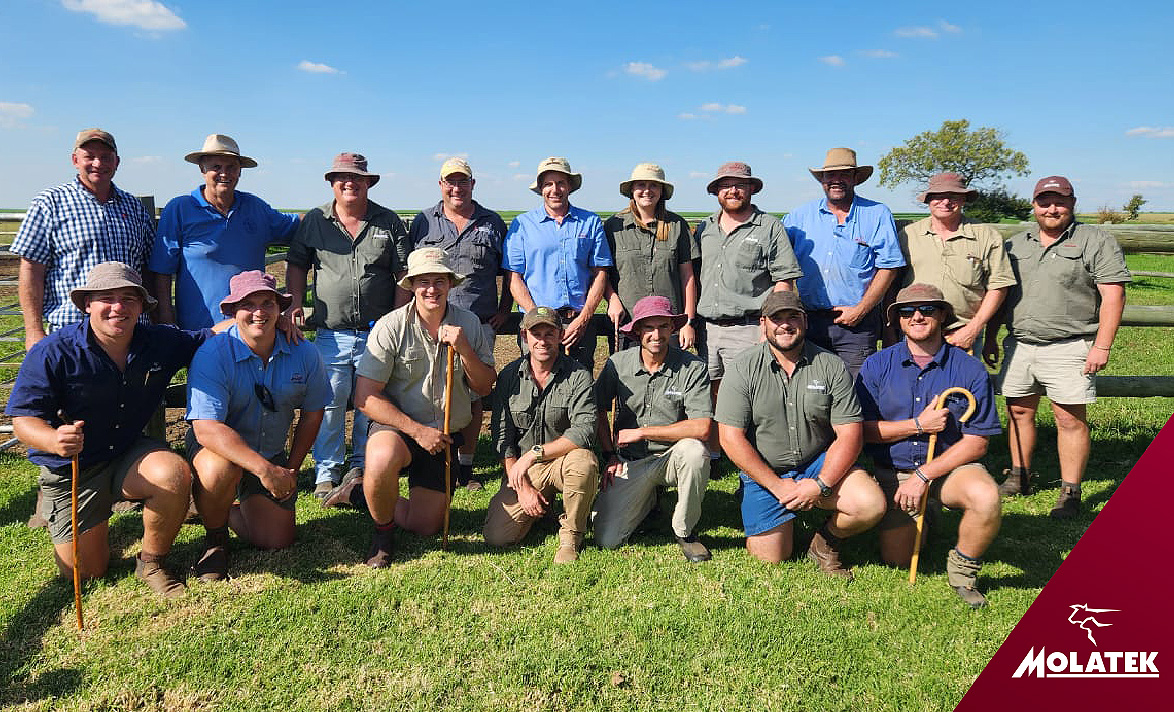Sheep Management on pastures
DR VLOK FERREIRA
NATIONAL TECHNICAL MANAGER RUMUNANTS, MOLATEK
Natural pastures, South Africa’s largest crop, should no longer be taken for granted. Correct management, including using scientifically controlled grazing, avoiding overgrazing by both domestic livestock and wild game, and using supplemental feeding, can improve most grazing areas.
Optimum utilization of pastures by sheep is very difficult to attain. As pasture forage matures, the protein content declines, fibre increases, and both forage intake and digestibility decline. Sometimes the combination of internal parasites and the inability of young lambs to consume adequate dry matter invariably results in weight gain of 40 to 60 % lower on pasture than in a feedlot.
Sheep efficiently convert forage into meat and wool. Part of the efficiency is due to their ability to be selective in plants and parts of a plant they graze. Selective grazing allows sheep to consume the most palatable parts of the plants, and these palatable plant parts usually are the most nutritious. Selective grazing is highest when sheep have access to the entire pasture. They can seek out preferred plants and plant parts from a large area when abundant forage is available.
Unfortunately, continuous grazing of the entire pasture can reduce productivity of both pasture and sheep. In the long-term plants need an opportunity to regrow and recover from stress and injury caused by grazing. Plants get no rest under continuous grazing because sheep selectively graze off young, succulent regrowth soon after it develops on a plant, prohibiting recovery and increasing plant stress. Repeated grazing of the same plant soon causes the plant to become weaker, lose vigour and reduce yield or die. As a result, less forage becomes available for grazing and sheep are forced to consume lower quality forage and reduce their intake, especially if limited pasture is available.
In contrast, if sheep are prevented from consuming regrowth soon after it develops, the plant produces more leaf area, more yield, and can recover rapidly for the next grazing. Rotational grazing is necessary to control sheep and grazing. Rotational grazing most commonly is accomplished by using independent pastures and/or cross-fencing. Perennial pastures can be cross fenced to develop several smaller areas to graze for short periods of time before moving sheep to a new pasture. Separate pastures of various alternative annual forages can be grazed for brief periods of time to provide rotational effects, and these annual pastures can be cross fenced to permit rotational grazing within them.
Rotational grazing is essential on perennial pastures, especially if several pasture species are mixed in the pasture. Without rotational grazing, sheep selectively graze plants they prefer, and avoid other plants. Soon the preferred plants are weakened, and the avoided plants crowd them out. As a result, only plants less desirable to the sheep are available for grazing at a future date. Whereas rotational grazing forces sheep to consume some of all plants and allows all grazed plants to recover and regrow while sheep graze other pastures.
Plants vary in the way they respond to rotational grazing. Legumes like lucerne respond favourably to rotational grazing because their regrowth usually comes from crown buds located at the soil’s surface. Substantial time is needed before this new growth is ready for another grazing.
Many perennial grasses maintain some leaves near the soil surface that are difficult to graze. These leaves enable the grass to maintain some leaf area and photosynthesis even during continuous grazing. Thus, while rotational grazing is desirable, it is of less benefit for perennial grasses than for lucerne.
Annual grass forages regrow primarily from above ground tissue or buds at the soil surface. Annual grasses often need more leaf area remaining after grazing than do perennial grasses to encourage rapid regrowth, because annual grasses have less root storage of nutrients to help stimulate regrowth.
Internal and external parasites are a concern when using pastures for sheep. Monitoring the faecal egg count for internal parasites is essential. Lush pastures and long wet wool increase the hazard of fly strikes. Such sheep should be crotched before turning to lush pasture. With lucerne pasture, bloat is a potential hazard. Using a bloat-guard surfactant started three days before turning to pasture to prevent bloat has been used with some success, because it is important that enough of the product is utilized by all animals. Some clovers can also cause bloat. If sudan or sorghum-sudan pastures are grazed, drought stress can increase the hazard of prussic acid poisoning. Allow these crops to become 50 cm high before grazing to decrease some of the prussic acid concern. Stover is an excellent source of roughage and grain. However, maize, barley, wheat, and soya stover grazing can cause acidosis, as well as enterotoxaemia. Acidosis (grain overload) is due to rapid consumption of large amounts of grain, and enterotoxaemia (overeating disease) is due to a continuous high consumption of grains. Acidosis usually is caused by ewes consuming a large amount of grain the first day when turned to the stalks. To control this problem, limit grazing time (a half to one hour/day the first week) until the sheep are adapted to the high consumption rate of grain. Control enterotoxaemia by vaccinating ewes three to four weeks before turning them to harvested wheat, barley, maize, and soya rests. Use caution when grazing stalks/stubble during the last six weeks of a pregnant ewe’s gestation period. There may be insufficient energy in the stalks/stubble to meet the pregnancy needs if stalks/stubble were grazed earlier and the more nutritious grain and leaves removed.
Should you have any questions or concerns, contact your Molatek Technical Advisor.


